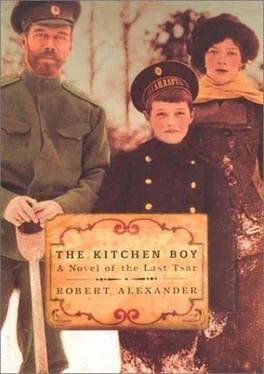“It is not permitted to visit with the detainees!” he snapped, his voice surprisingly deep and gruff.
Sister Antonina turned on him with a practiced and extraordinarily effective weapon of her own, a grandmotherly smile. “Of course, my son.”
“The komendant orders you to leave.”
“Da, da, da. We’re just going.”
“Now!”
“I understand, my son.” Sister Antonina then leaned forward and kissed me on each cheek, whispering in the faintest of angel voices, “Tell them to be ready as soon as tonight.”
Yes, those were the very words she planted in my ear, which to this day have lived within my being like an ear worm, a refrain that sings over and over, and from which I cannot escape. The good sister followed after the lad, and I expected the novice to simply and silently patter after them both. Instead, however, Novice Marina, her head slightly bowed as always, stepped quickly toward me and, much to my surprise, reached to kiss me as well. Wondering what it meant, I stood there, quite surprised to feel her young, fresh lips upon first my one cheek, then the other. To further startle me, she reached for my hand and clasped her soft fingers around mine. Only in that moment did I understand the reasons for her affection, because in the slightest, most subtle of moves she transferred a folded envelope from her palm to mine.
“Do svidanya,” I muttered.
As she hurried off, I slipped my hand into my pants, depositing the folded envelope into the secret darkness of my pocket. Going about my business, I reached for the butter yellow ceramic bowl in which cook always made the blini the Heir so dearly loved. And into this bowl, its glaze all crackled, I placed the brown eggs of the monastery chickens. I stacked them slowly, neatly, one fragile oval shell atop the other. Glancing first over my right, then my left shoulder, I discerned no guards in the corridor, nor any lurking in the dining room. My eyes met cook’s, and he gave me a slow, knowing nod as he went about his business of preparing macaroni for Aleksandra Fyodorovna.
I asked, “Will you prepare some of the eggs for Aleksei Nikolaevich’s midday meal?”
“I think certainly.”
I lifted the glass bottle of milk, finding it indeed as fresh and warm as a newborn. I checked the doorways once again, and pulled out the cork. As before, there was a tiny slit cut into the stopper, and I quickly pulled out the small note that was hidden there. I started to-
“Leonka,” called a deep voice from the doorway.
I jumped, nearly spilled the entire bottle of milk, and did in fact drop the cork to the floor. As quickly as I could, I crammed the note into my pocket.
“Sh-to?” What?
I turned to see the Tsar’s faithful footman, Trupp – Aleksei Yegorovich Trupp – standing in the doorway. He was an old man by then, somewhere over sixty, and had wiry gray hair and a healthy paunch. I think that he’d served not only during all of Tsar Nikolai’s twenty-three year reign, but had also waited upon Nikolai’s father, Tsar Aleksander III. A life without a tsar was simply impossible for Trupp, who had gladly shared the royal family’s year-and-a-half imprisonment.
“Leonka,” began the manservant once again, “if the nuns have brought more fresh milk, Yevgeny Sergeevich requests that you be so kind as to bring him a glass… to, ah, ah, soothe his stomach, of course.”
“Certainly.”
Trupp withdrew himself, which went quite against the worn-out protocol of the Imperial Household. Then again, these were extraordinary times and everything had changed. In previous times, however, a boy of my low status would never have been allowed to carry a mere glass or a simple plate to the dinner table or anywhere else within the royal apartments. Absolutely not. Back then, back in those days at Tsarskoye, everyone had a position and a purpose, and I would have remained entirely within the confines of the kitchen, which was in a separate building and attached to the Aleksander Palace only by tunnel. Any food that was brought to Their Highnesses or guests was done so by footmen like Trupp, who usually transported any nourishment with great haste, running through the long tunnel and down the long, straight halls of the palace. Upon entering the private rooms, however, one had to be quiet, for Aleksandra Fyodorovna hated the clatter of dishes, not to mention kitchenly smells, the likes of which now perfumed our daily existence.
But these were different days indeed. And I was no fool. It was my presence, not a glass of milk, that was requested.
I took one of the thin glasses, poured some thick, rich milk. And then I recorked the glass bottle and glanced once at cook, who nodded at me ever so slightly. I proceeded through the hallway where I slept, into the dining room where Anastasiya Nikolaevna still sat with her drawing tablet – this was the route, this was my course. The youngest of the daughters looked up at me only briefly, her face blank. She was learning quickly the language of mistrust, of course, for there was a guard standing in the far corner, a tall fellow with dark hair and a huge bushy mustache. And so I continued to the other end of the dining room, to the left, and into the long drawing room.
The three of them – Tsar, Tsarevich, and doctor – were in the alcove at the far end. This was where Botkin slept, next to the large wooden desk in the alcove. He was reclined there, while the Tsar sat alongside in a comfortable wooden chair and the Heir remained in the wheeling chaise. Nikolai Aleksandrovich continued the pretense of reading aloud as I circled the large potted palm, but then he stopped as I delivered the glass to Botkin.
“The sestra has just brought milk from the monastery, Yevgeny Sergeevich. It’s still warm – she said it’s fresh from the cow this morning.”
“Spacibo, molodoi chelovek.” Thank you, young man, said the doctor, accepting the glass.
I turned to the Tsar, hesitated. Nikolai Aleksandrovich eyed the drawing room, then laid those magnificent eyes upon me. With a single nod, he bade me forward. I stabbed my hand into my pocket and snatched out the folded piece of paper and the envelope too.
“The paper was in the cork,” I whispered. “And the other, the envelope, was given me by Novice Marina.”
Nikolai Aleksandrovich looked at them both, and spying the handwriting on the envelope, muttered with a smile, “Ah, a letter from Anya.”
He was referring, of course, to the Tsaritsa’s only companion, her blindly faithful friend, Anna Vyrubova, the Cow, as the Empress referred to her whenever she was out of favor, which happened from time to time. But a loyal friend this Anya was. Persecuted too, for the entire country thought she not only worked hand in hand with Rasputin, but that the Empress, the mad monk, and Anya herself formed a poisonous camarilla bent on the destruction of Holy Mother Russia. For this Vyrubova was dragged from the Aleksander Palace and thrown into one prison after another, from the pits of the Fortress of Peter and Paul to Krondstadt itself. It was a miracle she survived at all – the starvation, the beatings, the filth, and the scourge. But she did survive; somehow she escaped an appointment with her own execution, went into hiding for several years, and then eventually fled across the ice floes to Finland, where she became a nun and lived all the way until 1964. And it is to Anna Vyrubova’s credit that she was one of the few who worked secretly and continuously to save the Imperial Family, sending hundreds of thousands of rubles to secret agents in Siberia who, in the end, did little but pocket the fortune.
I leaned closer to the Tsar and quickly whispered, “Sister Antonina also said this, she said: ‘tell them to be ready as soon as tonight.’ ”
Читать дальше












